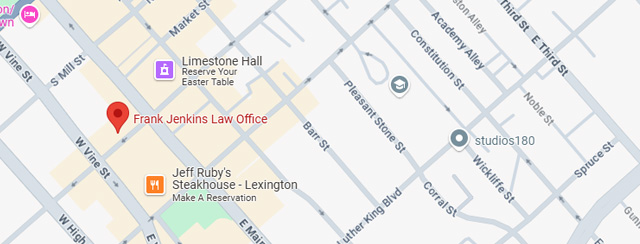Serious work-related injuries happen every day and leave Kentucky workers disabled and out of work.More than 900,000 workers across the country suffered injuries that prevented them from working for some length of time during 2011, according to the U.S. Bureau of Labor Statistics (BLS).
The workers’ compensation programadministered through the Kentucky Labor Cabinet is an insurance program that provides money to people whose work-related injury or occupational disease leaves them unable to work for a living. Unfortunately, obtaining workers’ compensation benefits can be a complicated and lengthy process. Many injured workers do not get the benefits they need and are entitled to receive.
That’s where the Frank Jenkins Law Office can help. Our Lexington workers’ compensation lawyers help injured and disabled workers obtain the benefits they deserve. Call us today toll free at 859-389-9344 or fill out our online contact form to set up a free initial consultation.
Obtaining Workers’ Compensation Benefits
To begin the process of obtaining workers’ compensation benefits after you have suffered a workplace injury or illness in Kentucky, you must report the injury and get medical help.
As soon as it is practical after your injury, you must notify your employer of the accident and your injury. Advise your employer as to what happened and what parts of your body were affected. Most employers have a written policy for reporting injuries.Follow that policy as closely as possible.
Some employers have a managed care network, though they are not common. If your employer has an authorized managed care program, you must seek treatment from a doctor authorized by that program. Otherwise, you are free to choose any doctor that will accept the workers’ compensation fee schedule. After selecting your doctor, you may change doctors once without being required to explain.Identify your employer and tell the doctor that your injury happened in a workplace accident –or that your illness developed — while you were engaged in job duties. Ask the doctor to promptly report your status to your employer and the insurance carrier. Follow any instructions you receive from the doctor pertaining to your workplace injury or illness.
Your employer and/or your employer’s insurance company are required to report any injury that causes an employee to miss more than one day of work to the Department of Workers’ Claims. Employers are also responsible for subsequent reports about the injured employee’s status.
The Kentucky workers’ compensation program looks for workers’ compensation cases to be settled between the employer and the injured employee, and most are resolved by a settlement before a claim is filed. Such a settlement may be an agreement for a lump-sum payment, which the Department of Workers’ Claims says “is voluntary and may involve less money for the injured worker because it is an immediate payment.”
If an agreement is made, the employer and the injured worker sign a form known as the “Agreement as to Compensation and Order Approving Settlement”and send it to the Department of Workers’ Claims, where it must be approved by an Administrative Law Judge.
Filing a Workers’ Compensation Claim in Kentucky
If the injured employee and the employer / insurance company cannot agree, the parties must litigate the claim. This is when an injured worker files a workers’ compensation claim.
Here is what the Kentucky Labor Cabinet, Department of Workers’ Claims says on its own website about the workers’ compensation claim process:
“Due to the complexity of the claims process, most injured workers hire an attorney to file a workers’ compensation claim for them. Nevertheless, employees may choose to represent themselves, but they will be held to the same standards as attorneys who present workers’ compensation claims.”
Once an injured employee (or an attorney on his behalf) files what’s known as an application for adjustment of the claim with the Department of Workers’ Claims, the Department assigns the case to an Administrative Law Judge (ALJ) and schedules a benefit-review conference. This is an informal presentation of the case by both sides before the ALJ, with one goal being to reach a settlement.
For a successful claim, your evidence should show that you suffered an “injury” as defined by the Workers’ Compensation Act (among other things),which is a “work-related traumatic event or series of traumatic events, including cumulative trauma, arising out of and in the course of employment which is the proximate cause producing a harmful change in the human organism evidenced by objective medical findings.”An injury caused by a slip, trip or fall, for example, could qualify for workers’ compensation benefits. Occupational injuries that occur over time can also qualify for workers’ compensation. This includes, for example, a repetitive trauma injury like carpal tunnel syndrome, or a chronic obstructive pulmonary disease (COPD) caused by years of inhaling toxic chemical fumes at a job site.
But, you must demonstrate that there is a causal connection between your job and the injury or illness that your claim refers to. You will need to provide evidence that you were performing a job duty authorized by your supervisor at the time of the accident or that your job duties contributed to your illness.
If the benefit-review conference does not end in a settlement, the ALJ will schedule a formal hearing, typically within 30 days. This is a hearing with testimony from both sides and a court reporter who makes a complete record of the proceedings. Within 60 days of the hearing, the ALJ will issue a decision that awards or denies income or medical benefits.
If that decision is not satisfactory to any party in the case, they may appeal to the Workers’ Compensation Board (WCB). This review will be based on the ALJ’s application of the law to the facts of the case. No new evidence will be allowed.
The WCB’s decision may be appealed to the Kentucky Court of Appeals, and then to the Supreme Court of Kentucky, which has the last word on the matter.
Need Help with a Workers’ Comp Claim or Appeal? Contact Us Today
If you or a loved one needs legal assistance with a workers’ compensation claim, or if you have questions about appealing a decision, contact the Frank Jenkins Law Office today at 859-389-9344 or fill out our online contact form.
Our Kentucky workplace injury lawyers assist injured people with workers’ compensation claims in Lexington and the surrounding communities of Berea, Georgetown, Nicholasville, Paris, Richmond, Versailles and Winchester, as well as all of Eastern Kentucky and throughout the state.












